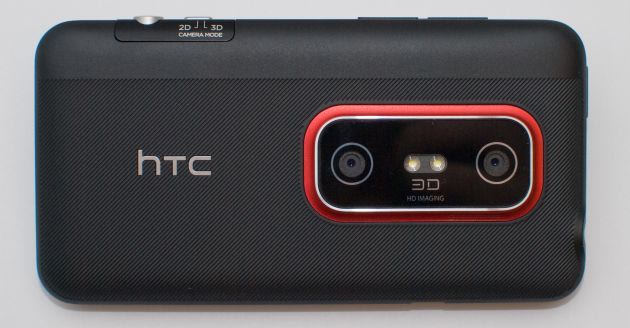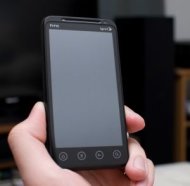
The world's first 3D-capable smartphone gets thoroughly tested
Last week, Sprint launched the U.S.'s first 3D-capable smartphone — the HTC Evo 3D. Based on the same design as Sprint's original Evo 4G that debuted last summer, this new phone comes packed with features and speed improvements that make it attractive to anyone, even if you're not a fan of the emerging 3D craze.
Iconic look and feel
When you pick up the Evo 3D, one of the first things you will notice is its solid, softly curved body style. The front bezel appears to be made out of a lightweight metal that houses the phone's sleekly beveled earpiece, notification LED, and 1.3-megapixel front-facing camera.

Evo 3D at an angle
At the top of the phone, you will find the standard power button and headphone jack. The left side houses the micro-USB charging port, while the right side contains the volume buttons, 2D / 3D camera mode slider, and a handy camera button. The camera controls are metal and feel very solid when used, but the plastic power and volume buttons are flimsier and less responsive than we would prefer.
The back of the phone is covered in a black, textured, easily gripped plastic that wraps around the sides of the unit. A massive red-lined pod houses the phone's dual 5MP cameras, a speaker, and a dual LED flash. This pod takes up almost one-fifth of the back of the unit, measuring roughly 1" by 2", and causes the phone to wobble a little bit when you set it down on its back. Somewhat surprisingly, HTC opted to not build a kickstand (like the one found on the Evo 4G) into this unit.
Using the camera, video, and 3D features
As its name suggests, one of the main selling points of the Evo 3D is its ability to record 3D content. This is done by simply sliding the camera mode selector on the right side of the unit from 2D to 3D. This enables both of the 5-megapixel autofocus cameras on the back of the unit, letting you capture pictures or video in full, stereoscopic 720p HD.
There are a few limitations to 3D that you should be aware of, lest you get your hopes up too high. The only way to record 3D content is by holding the phone in its horizontal position, which puts the cameras side-by-side (something necessary for stereoscopic images). Also, due to the fact that the cameras are placed about an inch apart, if you are trying to do any sort of macro 3D recording, the image quality will be virtually unusable.

Cats are always willing participants in phone testing
No matter which mode you choose to shoot in, taking a picture or video is made easy by the handy camera button that sits next to the camera mode slider. This 2-stage button will focus the image when pressed down halfway and take a picture (or record video) when pressed down all of the way.
Blazingly fast speeds
The Evo 3D runs the latest and greatest Android Gingerbread (2.3) operating system, enabling new features such as improved power management and video chat through the Google Talk app. It also includes the somewhat controversial HTC-specific Sense 3.0 user interface (UI), designed to give you a more informative lock screen, as well as more social features.
Everything about using this phone is quick, from placing calls to playing games. This is mainly thanks to the dual-core 1.2GHz processor and 1GB of RAM, which make it one of the fastest phones on the market. Like its older sibling, the Evo 3D is both 3G- and 4G-capable and can connect to any home b/g/n wireless network. It is also bluetooth 3.0-capable, should you need to connect any devices wirelessly.
Tecca's take

Evo 3D front view
The blazing fast processor speed, healthy amount of RAM, latest and greatest communications standards, and gorgeous display all make this device worth owning. Unfortunately, all of that comes at the cost of reduced battery life — as little as 14 hours, according to some tests. This life can be increased a bit by disabling certain features such as 4G connectivity and GPS.
At Tecca, we love this phone. But due to the lower battery life, lack of 1080p 2D video recording capabilities, and flimsy power and volume buttons, we rate the EVO 3D at 4 out of 5 stars.
Post by Jacob Bolm
More from Tecca:
No comments:
Post a Comment